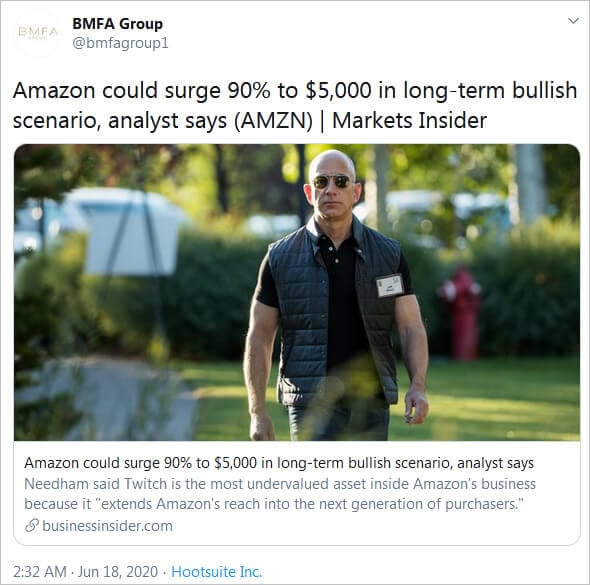Jeff Bezos Will Be Worth $300 Billion When Amazon Becomes World’s ‘8th Largest Economy’

The gap between Jeff Bezos and the rest of the billionaire's list could widen as Amazon's share price soars. | Image: AP Photo/Charles Krupa
- Needham sees Amazon nearly doubling its share price in the long-term.
- In 2020, Amazon has been one of the best-performing stocks on the NASDAQ.
- If the bullish scenario plays out, the wealth gap between Bezos and the second-richest man could widen, all other factors remaining constant.
Amazon (NASDAQ:AMZN) has been one of the outstanding stay-at-home stocks of 2020. Year-to-date, the share price has appreciated by about 40% . And since hitting a 2020 low in mid-March, AMZN has recovered nearly 60%.
Needham analysts now see even more upside potential. According to the Wall Street firm, Amazon could be worth up to $5,000 per share in the long-term. Needham expects this to be achieved on the back of Amazon’s market expansion, expanding media business, and the revenue advantages accruing from a ballooning ecosystem.

Amazon’s growing services revenue is also another factor that provides more upside potential, per Needham. In the last five years, Amazon’s service business has grown from 28% to 43% of total sales.
How much will Jeff Bezos be worth?
If Needham’s maximum stock price target is achieved, the world’s richest person could see his wealth nearly double.
Currently, Bezos holds 55,491,172 million shares of the online retailer. At $5,000 per share that would translate to over $277 billion. Other assets that the Amazon founder owns would see his net worth easily approach $300 billion.
At the moment, Bezos is worth $158 billion . About $146 billion of this comes from his Amazon stake.

If Amazon were a country
Amazon’s current market cap stands at $1.32 trillion . At a projected stock price of $5,000, Amazon would be worth $2.5 trillion. That would be about 3% of global GDP based on current global wealth figures.
Only the U.S., China, Japan, Germany, India, the U.K., and France have GDP that exceeds $2.5 trillion. A $5,000 stock price would make Amazon equivalent to the world’s eighth-largest economy.
At the current figures, Amazon’s market cap is just about the size of Australia’s GDP, the world’s 13th largest economy.

Is the $5,000 price target achievable?
To reach Needham’s price target, Amazon’s stock would have to gain 90%. That’s not unachievable for Amazon, given its record. Just five years ago, the stock was trading below $500. It has grown over 400% in half a decade.
But there are significant risks that could prevent Amazon from reaching Needham’s target. Specifically, its size and reach into diverse sectors of the economy are creating a regulatory backlash.
Amazon too big to ignore
In the U.S., Amazon is facing antitrust probes in two states–California and Washington. The Federal Trade Commission is also investigating Amazon’s business practices in retail and cloud computing. Additionally, Congress is conducting antitrust investigations into Amazon and other Big Tech companies.

Across the Atlantic, the EU’s antitrust watchdog is reportedly on the verge of filing charges against the online retail giant over the treatment of third-party sellers on its marketplace. If Amazon overcomes these hurdles, hitting $5,000 will not be unimaginable.
Disclaimer: This article represents the author’s opinion and should not be considered investment or trading advice from CCN.com. The author held no investment position in Amazon at the time of writing.